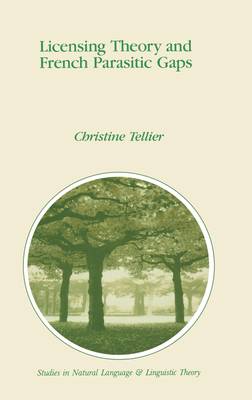
- Afhalen na 1 uur in een winkel met voorraad
- Gratis thuislevering in België vanaf € 30
- Ruim aanbod met 7 miljoen producten
- Afhalen na 1 uur in een winkel met voorraad
- Gratis thuislevering in België vanaf € 30
- Ruim aanbod met 7 miljoen producten
Zoeken
Omschrijving
1 /Theoretical Background.- 1.1. Government-Binding Theory.- 1.1.1. X-Bar Theory.- 1.1.2. ?-Theory.- 1.1.3. Case Theory.- 1.1.4. Binding Theory.- 1.1.5. Control Theory.- 1.1.6. Bounding Theory.- 1.1.6.1. Bounding Nodes.- 1.1.6.2. Barriers.- 1.1.7. Government Theory.- 1.1.7.1. Disjunctive ECP.- 1.1.7.2. Conjunctive ECP.- 1.2. Parasitic Gaps.- Notes.- 2 / Universal Licensing.- 2.0. Introduction.- 2.1. Licensing.- 2.1.1. Full Interpretation.- 2.1.2. Universal Licensing.- 2.1.3. Full Interpretation at D-Structure.- 2.2. Licensing at D-Structure.- 2.2.1. Predication.- 2.2.1.1. Null Predicates.- 2.2.1.2. Adjunct Null Operators.- 2.2.2. Quantification.- 2.2.2.1. Operators in [Spec, CP].- 2.2.2.2. Base-generated Wh-constructions.- 2.2.2.3. Resumptive Pronouns within Questions and Relatives.- 2.2.2.4. Types of Resumptive Pronouns and the Wh/ Relative Asymmetry.- 2.2.2.4.1. Vata.- 2.2.2.4.2. Modern Hebrew.- 2.2.2.4.3. Standard Arabic.- 2.2.2.4.4. Hausa.- 2.3. Licensing at S-Structure: Null Operators.- 2.3.1. Parasitic Gaps.- 2.3.2. Null Operator Constructions in English and French.- 2.3.3. Null Topics.- 2.4. Universal Licensing and Parasitic Gaps.- 2.5. Summary.- Notes.- 3 / Double Dont Constructions.- 3.0. Introduction.- 3.1. Genitival Relatives.- 3.1.1. Dont as a Case-Marked C0.- 3.1.2. Dont Relatives and the Subject Condition.- 3.2. Non-Movement Relatives With Dont.- 3.3. Double Constructions with Dont.- 3.3.1. The Problem.- 3.3.2. Adnominal Complements and the Projection Principle.- 3.4. Identifying the Gaps.- 3.4.1. Adnominal Gaps Are Not Anaphoric.- 3.4.2. pro or Variable?.- 3.4.2.1. pro in French: Orphan Prepositions.- 3.4.2.2. Adnominal Gaps Are Not pro.- 3.4.2.3. Adnominal Gaps Are Variables.- 3.4.3. Problems With Multiple Extraction.- 3.5. Summary.- Notes.- 4/Null Operators In DPs.- 4.0. Introduction.- 4.1. Null Operators in Noun Phrases at S-Structure.- 4.1.1. DDCs Are Parasitic Gap Constructions.- 4.1.1.1. Syntactic A?-Movement.- 4.1.1.2. C-command from the Binder.- 4.1.1.3. Anti-c-command and Locality.- 4.1.2. [Spec, CP) as an A?-Position.- 4.2. Null Operators in Noun Phrases at D-Structure.- 4.2.1. The Thematic Structure of Nominals.- 4.2.2. Arguments and Adjuncts in DDCs.- 4.2.3. Relational Nouns and Possessor Arguments.- 4.2.3.1. Generic Contexts.- 4.2.3.2. Determiner Types.- 4.3. Easy-Type Constructions in Noun Phrases: Inalienable Possession.- 4.4. Summary.- Notes.- 5 / Locality In Double Dont Constructions.- 5.0. Introduction.- 5.1. Two Chain Approaches to External Locality.- 5.1.1. Chain Composition.- 5.1.2. Chain Formation.- 5.2. DDCs and Chain Composition.- 5.2.1. Adnominal Gaps Within PPs.- 5.2.2. Adjunct Clauses.- 5.2.3. Adnominal PGs in Embedded Clauses.- 5.3. Deriving the Properties of PG Constructions.- Notes.- References.- Index Of Names.- Index Of Subjects.
Specificaties
Betrokkenen
- Auteur(s):
- Uitgeverij:
Inhoud
- Aantal bladzijden:
- 232
- Taal:
- Engels
- Reeks:
- Reeksnummer:
- nr. 26
Eigenschappen
- Productcode (EAN):
- 9780792313113
- Verschijningsdatum:
- 31/10/1991
- Uitvoering:
- Hardcover
- Formaat:
- Genaaid
- Afmetingen:
- 156 mm x 234 mm
- Gewicht:
- 503 g

Alleen bij Standaard Boekhandel
+ 512 punten op je klantenkaart van Standaard Boekhandel
Beoordelingen
We publiceren alleen reviews die voldoen aan de voorwaarden voor reviews. Bekijk onze voorwaarden voor reviews.











